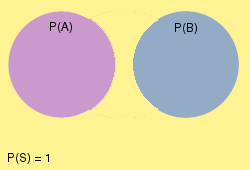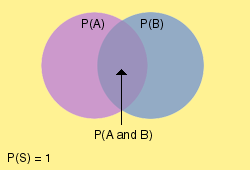 Experiment 1: A single card is chosen at random from a standard deck of 52 playing cards. What is the probability of choosing a 5 or a king?
Experiment 1: A single card is chosen at random from a standard deck of 52 playing cards. What is the probability of choosing a 5 or a king?
Possibilities:
1. The card chosen can be a 5.
2. The card chosen can be a king.
 Experiment 2: A single card is chosen at random from a standard deck of 52 playing cards. What is the probability of choosing a club or a king?
Experiment 2: A single card is chosen at random from a standard deck of 52 playing cards. What is the probability of choosing a club or a king?
Possibilities:
1. The card chosen can be a club.
2. The card chosen can be a king.
3. The card chosen can be a king and a club (i.e., the king of clubs).
In Experiment 1, the card chosen can be a five or a king, but not both at the same time. These events are mutually exclusive. In Experiment 2, the card chosen can be a club, or a king, or both at the same time. These events are not mutually exclusive.
Definition: Two events are mutually exclusive if they cannot occur at the same time (i.e., they have no outcomes in common).
Experiment 3: A single 6-sided die is rolled. What is the probability of rolling an odd number or an even number?
![]()

Possibilities:
1. The number rolled can be an odd number.
2. The number rolled can be an even number.
Events: These events are mutually exclusive since they cannot occur at the same time.
 Experiment 4: A single 6-sided die is rolled. What is the probability of rolling a 5 or an odd number?
Experiment 4: A single 6-sided die is rolled. What is the probability of rolling a 5 or an odd number?
Possibilities:
1. The number rolled can be a 5.
2. The number rolled can be an odd number (1, 3 or 5).
3. The number rolled can be a 5 and odd.
Events: These events are not mutually exclusive since they can occur at the same time.
Experiment 5: A single letter is chosen at random from the word SCHOOL. What is the probability of choosing an S or an O?
Possibilities:
1. The letter chosen can be an S
2. The letter chosen can be an O
Events: These events are mutually exclusive since they cannot occur at the same time.
Experiment 6: A single letter is chosen at random from the word SCHOOL. What is the probability of choosing an O or a vowel?
Possibilities:
1. The letter chosen can be an O
2. The letter chosen can be a vowel
3. The letter chosen can be an O and a vowel
Events: These events are not mutually exclusive since they can occur at the same time.
Summary: In this lesson, we have learned the difference between mutually exclusive and non-mutually exclusive events. We can use set theory and Venn Diagrams to illustrate this difference.
Mutually Exclusive Events
Two events are mutually exclusive if they cannot occur at the same time (i.e., they have no outcomes in common).

In the Venn Diagram above, the probabilities of events A and B are represented by two disjoint sets (i.e., they have no elements in common).
Non-Mutually Exclusive Events
Two events are non-mutually exclusive if they have one or more outcomes in common.

In the Venn Diagram above, the probabilities of events A and B are represented by two intersecting sets (i.e., they have some elements in common).
Note: In each Venn diagram above, the sample space of the experiment is represented by S, with P(S) = 1.
Exercises
Directions: Read each question below. Select your answer by clicking on its button. Feedback to your answer is provided in the RESULTS BOX. If you make a mistake, choose a different button.
| 1. | Which of the following are mutually exclusive events when a single card is chosen at random from a standard deck of 52 playing cards? |
| 2. | All of the following are mutually exclusive events when a single 6-sided die is rolled EXCEPT: |
| 3. | Which of the following are mutually exclusive events when a day of the week is chosen at random? |
| 4. | A single letter is chosen at random from the word TEACHER. All of the following are mutually exclusive events except: |
| 5. | Which of the following are mutually exclusive events when a month of the year is chosen at random? |




